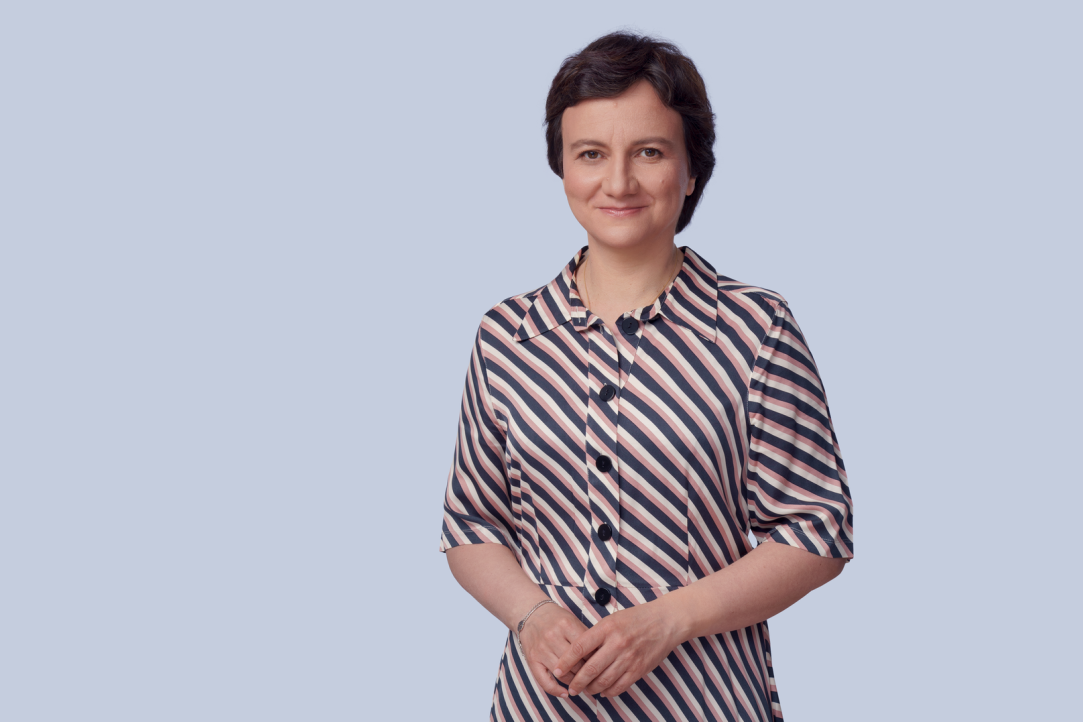Mirror Laboratories: Uniting Researchers from Different Universities

HSE Vice Rector Maria Yudkevich speaks about the launch of Mirror Laboratories, the third open project competition held by HSE University. Teams from Russian universities, research organisations, and government research centres looking to collaborate with HSE research departments are invited to participate in the competition. Applications will be accepted until May 20.
Mirror Laboratories are research projects implemented by HSE University in partnership with other Russian academic and research organisations. The idea of these projects is to bring together two teams of researchers working on a common topic and conducting similar research. HSE University research departments and those elsewhere in the country working in the same field and with a similar research agenda can apply to the competition as a team. If they win, they form a 'mirror project' in which both departments complement each other, share the same ideas, goals, objectives, etc. This is why they are called 'mirrors'—they are a reflection of each other. Such laboratories cooperate and receive funding for three years.
The Mirror Laboratories project has been conceived and organised as part of University Partnership, a larger project of HSE University. Apart from the Mirror Laboratories, the initiative covers many other important tools, including internships at HSE University and a programme for Russian postdoctoral fellows. However, the Mirror Laboratories project is the most ‘institutionalised’ event because it involves joint three-year research cooperation between existing HSE University departments and those in other universities selected as a result of the competition.
We run this competition every year. This year, we will be holding it for the third time. We will be accepting applications until May 20 and will announce the results on July 8. Full information about the competition is available on the HSE Mirror Laboratories website. We are trying to increase awareness of the competition as much as possible. When we announced the competition for the first time, we did not know that we would have to face a long period of pandemics and travel restrictions, so we thought we would meet with the participants in person and enjoy offline cooperation. However, these two years have shown that the laboratories can cooperate online equally well.
We are now expecting applications from people prepared to work remotely most of the time
Last year, we expanded the audience of the competition: in addition to applications from joint teams of HSE University and other Russian universities, we also began accepting joint applications from HSE University and research institutes. We hope that this year, we will have joint projects of HSE University and regional institutes of the Russian Academy of Sciences. One of the objectives of the Mirror Laboratories (as well as many of the projects we run on a competitive basis) is to create a research school and foster young scientists. Therefore, mutual internships, summer schools, tours of regional and Moscow universities, and similar events have always been an important part of the Mirror Laboratories.
Future researchers will certainly benefit from opportunities to work with other universities and research institutes
Thirty-three research projects took part in the first Mirror Laboratories competition in 2020. Applications were filed jointly by HSE research departments and 27 Russian partner universities. There were thirteen winning projects. In the 2021 competition, 32 applications were submitted jointly with 25 Russian universities and research centres, with ten projects named the winners.

Last year, we received more than three applications per vacancy. We expect applications to be fairly detailed, so it takes a long time for our colleagues to prepare, discuss, and work out the details. Applying to our competition takes a lot of work. We are always faced with a difficult choice. We see how many of our colleagues learn from their mistakes. Sometimes, we receive an application that we are potentially interested in, but we do not support it because it is not developed enough. Next time, we receive the same application and see that the applicants have been working for a whole year and have managed to make a more substantial application despite a lack of centralised support. In 2020, during the first wave of the competition, we rejected some applications, but in 2021, our colleagues submitted a revised version that we were happy to support.
It should be noted that the most sustainable projects arise when applicants make the most of a history of productive relations, and this background enables them to take the project to the next level
Firstly, it is important to us that projects have practical applications and are of interest to both parties involved. Secondly, the parties need to invest valuable competencies in the project and learn something from each other. This is important because we do not want people to think that everyone should learn from HSE University and that our university always acts as a ‘big brother’. This is not the case. Many projects are implemented by collaborative efforts from both sides—twice the expertise is invested, and we both learn from each other. Thirdly, it is desirable that some intellectual property be created as part of the laboratory work, not only in the form of publications, but also in the form of databases, patents, and practical developments.
We have a number of projects that focus on solving specific regional problems
For example, the HSE Vishnevsky Institute of Demography and the Laboratory for Social and Demographic Research at Bashkir State University study the impact of demographic changes on human development in Russian regions and develop recommendations for optimising regional demographic and social policy, aimed at achieving Russia’s national development goals.
Another example is the collaboration between the HSE Institute for Economics and Regulation of Natural Monopolies and the International Laboratory for Regional Problems of Energy Development at the Irkutsk National Research Technical University. The team is developing energy infrastructure models for remote and isolated Russian territories that lack connections to centralised electricity grids and heat supply systems. This is the case for about 80% of territories in Russia.
Maria M. Yudkevich
See also:
HSE and UTM Present Results of Mirror Laboratory's Work at Russian–Malaysian Commission
HSE University–St Petersburg and the Universiti Teknologi Malaysia (UTM) presented the results of two years of work and a development roadmap for the mirror laboratory on social entrepreneurship. The document outlines the strategy for global transformation in the business and digital innovation sphere.
'We View Mathematics as a Universal Language for Natural Sciences, Economics, and Computer Science'
The Laboratory for Geometric Algebra and Applications at the HSE Faculty of Economic Sciences is developing a universal language for mathematics, physics, and other exact and natural sciences. It is creating computational methods that are applied in geometry, physics, machine learning, engineering, computer science, and other fields. The laboratory’s staff, including doctoral students, have published numerous articles in leading scientific journals and have taken part in major international conferences. Dmitry Shirokov, Head of the Laboratory, spoke with the HSE News Service about their work.
HSE Researchers Introduce Novel Symmetry-Aware Neural Network Architecture
Researchers at the HSE Laboratory for Geometric Algebra and Applications have developed a new neural network architecture that can accelerate and streamline data analysis in physics, biology, and engineering. The scientists presented their solution on July 16 in Vancouver at ICML 2025, one of the world's leading conferences on machine learning. Both the paper and the source code are publicly available.
'Biotech Is Booming Worldwide'
For more than five years, the International Laboratory of Bioinformatics at the HSE Faculty of Computer Science has been advancing cutting-edge research. During this time, its scientists have achieved major breakthroughs, including the development of CARDIOLIFE—a unique genetic test unmatched worldwide that predicts the likelihood of cardiovascular disease. With the active participation of HSE students, including doctoral students, the team is also working on a new generation of medicines. In this interview with the HSE News Service, Laboratory Head Maria Poptsova shares insights into their work.
'Samarkand—St Petersburg': HSE University–St Petersburg and Samarkand State University to Design Digital Future of Cultural Heritage
Samarkand State University named after Sharof Rashidov hosted the international research and educational seminar 'Branding Cultural Heritage: Digital Tools and Design Practices.' The event gathered researchers and students from Russia and Uzbekistan—participants of a large-scale project of the mirror laboratory 'Integrated Platform Solutions for the Preservation and Promotion of Cultural Heritage (Cases of Samarkand and St Petersburg)'.
'Our Goal Is Not to Determine Which Version Is Correct but to Explore the Variability'
The International Linguistic Convergence Laboratory at the HSE Faculty of Humanities studies the processes of convergence among languages spoken in regions with mixed, multiethnic populations. Research conducted by linguists at HSE University contributes to understanding the history of language development and explores how languages are perceived and used in multilingual environments. George Moroz, head of the laboratory, shares more details in an interview with the HSE News Service.
AI to Enable Accurate Modelling of Data Storage System Performance
Researchers at the HSE Faculty of Computer Science have developed a new approach to modelling data storage systems based on generative machine learning models. This approach makes it possible to accurately predict the key performance characteristics of such systems under various conditions. Results have been published in the IEEE Access journal.
HSE University–St Petersburg Presents Project on Social Entrepreneurship at Session of Russian–Malaysian Working Group
Alexander Sorokin, Dean of the St Petersburg School of Social Sciences, presented the results of a joint Russian–Malaysian mirror laboratory project in social entrepreneurship at the second meeting of the Russian–Malaysian Working Group on Education, Science, and Technology at the Universiti Teknologi Malaysia (UTM).
'The Branch of Medicine That Our Developments Primarily Target Is Cardiology'
The application of mathematical models to the diagnosis and treatment of cardiovascular diseases contributes to the effective detection of patient predispositions and supports the selection of best treatment strategies. The use of mathematical models helps create new diagnostic tools and train neural networks to assist clinicians. Researchers from HSE University and colleagues from Saratov State Medical University are engaged in this work as part of the Mirror Laboratories project. In this interview, Natalya Stankevich, Senior Research Fellow at the International Laboratory of Dynamical Systems and Applications of the HSE Campus in Nizhny Novgorod, talks about what the collaboration has achieved so far.
Mirror Laboratory of HSE and UTM Shares Its First Achievements
In autumn of 2024, a delegation from Malaysia, led by Minister of Higher Education Zambry bin Abdul Kadir, visited the HSE campus in St Petersburg. One of the key topics of discussion was the initial results of the mirror laboratory, a joint initiative between HSE University-St Petersburg and the University of Technology Malaysia (UTM).


